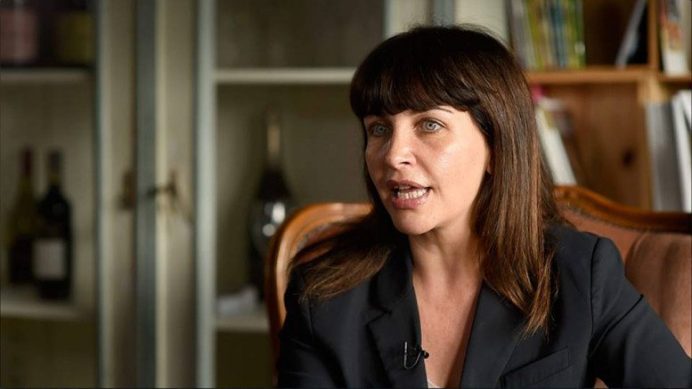Einat Wilf is the co-author of The War of Return (with former Haaretz journalist Adi Schwartz). She talked to Fathom deputy editor Calev Ben-Dor about the book’s main claims, that peace is impossible while the Palestinians claim a ‘right of return’ for millions of ‘refugees’, making the two states for two peoples solution to the conflict impossible, and that the UN Relief and Works Agency (UNRWA) is the key prop holding up this impossibilist demand. An English translation of an extract from Wilf’s foreword is available here. Download a PDF version here.
The Book
Calev Ben-Dor: The War of Return has been very popular in Israel and the English translation will be available in the coming year. You say the book is a product of a shared recognition between yourself and your colleague Adi Schwartz that whoever wants peace must invest in undermining Arab maximalism no less than in Jewish maximalism. What did you mean by that?
Einat Wilf: The world is particularly focused on aspects of Jewish maximalism, particularly the settlements, especially those deep in the West Bank. Certainly, the latter are intended to convey and embody the idea that the entire land between the Jordan River and the Mediterranean, which Jews call the Land of Israel, is exclusively Jewish. Settlers are intentionally trying to make it impossible to make peace based on the idea of two nation states, Israel and Palestine. Diplomats will regularly argue that settlements are the main obstacle to peace. Yet what Adi and I show in the book is that Arab maximalism is no less, and maybe even more of an obstacle to peace. And that is something that almost nobody talks about.
Arab maximalism is manifested through what Arabs and Palestinians call ‘The Right of return’. The essence of this ‘Right’ is that hundreds of thousands of Arabs (and their millions of descendants) who fled from the areas during the war they waged and lost against partition – a war intended to prevent the emergence of the State of Israel – have a right to settle within Israel in a way that would turn the Jews into a minority. And lest we forget, Jews being a minority generally does not turn out too well.
By Palestinians holding onto this idea of ‘Return’ for 70 years, they are essentially saying ‘the war isn’t over’. Their message is that even though they lost the battle to prevent Jews immigrating to the land, and the diplomatic battle to prevent the vote of partition in the UN, and the military battle against Israel’s birth, they are still continuing the war by other means. This is the idea of the ‘Right of Return’ of Arab ‘refugees’.
While Israeli settlement construction is taken as conclusive proof that Israel does not want a territorial partition, the lack of awareness of the strength of the Arabs’ demand for ‘return’ means few recognise Arab rejectionism as a serious obstacle to peace. Israel’s proven willingness to partition the land – in 1947, 2000, and 2008 – is often brushed aside with the claim that Israel does not really mean it, while the Arabs’ proven insistence on ‘return’ is explained away with the claim that they do not really mean that either.
UNRWA is part of the problem, not the solution
CB-D: Many of the specifics about the Trump administration policy of defunding UNRWA are unclear. For example, which institutions can replace UNRWA in the different areas in which it operates? You address this question and also examine how UNRWA’s calculation of refugee numbers should be reassessed. Can you explain your thinking on UNWRA?
EW: Rather than the United Nations Relief and Works Agency (UNRWA) alleviating a difficult situation, it has been one of its main creators and radicalising forces. Through its refugee camps, UNRWA became the incubator that nurtured and developed an angry, victimised, belligerent Palestinian nationalism, one trapped in its own millenarian visions of returning to a country where the Arabs are not a majority and without recognising the co-equal right of the majority group in that country to a state of its own. For example, the terrorists who carried out the Munich massacre and airplane hijackings were all children of UNRWA.
UNRWA operates in the West Bank, Gaza, Syria, Jordan and Lebanon, administering a total of 5.3 million refugees, yet almost none would be considered refugees by international standards. For example, 2.2 million UNRWA ‘refugees’, 40 per cent of the total, are Jordanian citizens. They vote and hold significant positions of power in Jordan. Citizens are not considered refugees in any other situation. In addition, 82 per cent don’t even live in camps throughout Jordan. Many of them are middle class professionals and wealthy business people. There is no connection between the broad image associated with the word ‘refugee’ and who they actually are.
Another 40 per cent, approximately 2.1 million people, live in the West Bank and Gaza. They are not refugees either. Certainly, by their own accounting they live in the territory of Palestine. UNRWA counts another million refugees in Syria and Lebanon, but we know from recent official census that the numbers are at least four times inflated because most long ago left. For example, the father of supermodels Gigi and Bella Hadid, a multi-millionaire living in LA is still on UNRWA’s books in Syria as a refugee from Palestine. This means that already 95 per cent of those registered by UNRWA as ‘refugees’ would not be considered refugees by international standards and in any other conflict. But even among the 250,000 who actually still reside in Syria and Lebanon, only the original people who fled war, crossed a border to another country, and did not receive citizenship, would be considered refugees, and had they had been treated like other refugees in the world they would have long ago been resettled and taken off the books.
As an organisation that provides social services, UNRWA is not necessary. In each area of operation, an alternative to UNRWA exists. The Palestinian Authority provides education and healthcare services, and there is no need for UNRWA to operate there as well. Donor states in the West Bank could divert the financial support for running of UNRWA schools and hospitals towards the Palestinian Authority. Nothing would change but the sign at the entrance to the school. In Gaza, a new umbrella organisation could be established whose only purpose would be the Strip’s rehabilitation, but which should be conditional on the establishment of a new agency incorporating of all UNRWA’s activities. Jordan has a healthcare and education system and UNRWA’s ‘registered refugees’ are Jordanian citizens, so they could and should be provided by their country. In Syria and Lebanon, the UN High commissioner for refugees can take over UNRWA services, with the view to ending the status of refugees, transferring some services to Syria, Lebanon, and private hands and ultimately taking the refugees off the books.
CB-D: You’ve been very critical of Western donors for funding UNRWA, but you’ve also been critical of Israel for allowing UNRWA to continue. Since the Trump Administration’s announcement, some Israeli security officials have expressed concerns that losing UNRWA will create a vacuum and could generate violence. What are your thoughts on that argument?
EW: Adi and I have been working on this issue for at least a decade, lobbying governments in Europe, Australia and the United States to change their policy on UNRWA. And we have called on the Israeli political system to remove the protection it has given to UNRWA. Our problem has been that one of the main lobbyists for UNRWA in western capitals has actually been the Israeli military! Our book is very critical of the Israeli security establishment’s position since 1967, when Israel first came to control territory in which UNRWA operated. Back then, the thinking was that since no one knows how long Israel would hold on to the territories, an organisation that was providing some healthcare and education services in the interim should be allowed to continue. Yet 50 years later, this situation remains, and it has been extremely detrimental to peace.
Even if – and it is a big if – funding UNRWA buys short term quiet, it is at the extremely high price of long-term conflict. When the Palestinians demand ‘return’ to Israel, that’s one thing. But when they feel this demand is a ‘right’ that is internationally sanctioned and receive money annually from western capitals, they get the message that they should continue believing Israel is temporary and will one day be undone. This extends the conflict.
The Israeli security establishment always argued that the choice is between two extreme options – provide UNRWA full protection or face a broad-based Palestinian uprising. No attempt has ever been made to formulate a more nuanced, creative, or visionary policy that would stop fully protecting UNRWA on the one hand while simultaneously trying to limit any potential dangers of violence on the other. Israel should work to facilitate the provision of aid, health, and education services to Palestinians in need, while at the same time detaching this service provision from the political objective of preserving and nurturing the demand for return.
Western states are complicit
Western states have given significant money to UNRWA over the decades. UNRWA’s annual budget for standing costs and special projects stood at around $1.2 billion in recent years. The US used to contribute almost one third of the total. The European Union contributes some $160 million; and individual European states, including Germany, the UK, Sweden, Switzerland, Norway, and the Netherlands are responsible for a further $400 million. Europe as a whole contributes roughly half of UNRWA’s total budget. Japan, Australia, and Canada are responsible for another $80 million. Meanwhile, the Arab world, which sees itself as the injured party from the 1948 war and from the creation of the refugee problem, rather than the side responsible, tends not to contribute to UNRWA. Arab states make intermittent and transient promises to contribute to specific projects, which are only very rarely fulfilled.
CB-D: One of your recommendations is for the Western states, if they are going to continue to give money to UNRWA, also issue a statement regarding their position on the right of return. Why?
EW: The western diplomats I speak to often deny that they politically support the Palestinians’ demand for ‘return’. Yet over the decades, Palestinians have taken western financial support for UNRWA as political support for their demand for ‘return’. I agree with the Palestinians. If a western government continues to give money to an organisation for 70 years, it’s hard to subsequently claim they don’t support what this organisation stands for. A parallel example would be if western governments actively gave settlements economic support while rolling their eyes and saying that the issue would be resolved in final-status talks. The policy of not having a position on the refugee issue is neither neutral nor static. Rather it means letting it grow daily till it completely eliminates any possibility of an accord. In the book we argue that if a government does continue to give money to UNRWA, it should, at the minimum, make a clear statement that says ‘Dear Palestinians, you are not refugees, there is no right of return but we are giving you some money because we like you’. That’s fine.
This obviously won’t mean that Palestinians will stop dreaming of an Arab Palestine from the river to the sea. But there is a difference between dreams and something they believe is a ‘right’ that is supported by the international community. If they are isolated in that demand, if – just like in the case of settlements – morning, noon, and night they would hear that ‘return’ is not a legitimate demand, that the international community doesn’t support it, that Palestinians cannot settle within the state of Israel, and that the international community will only support them if they want to stay the West Bank and Gaza, the likelihood greatly increases that a Palestinian leadership will emerge that finally tell their people, ‘enough’.
The international community needs ‘constructive specificity’ rather than ‘constructive ambiguity’
CB-D: During Oslo, you say, one of the assumptions was the need for ‘constructive ambiguity’ on core, final status issues such as Palestinian statehood, borders, settlements, Jerusalem and refugees, but that what is really needed now is ‘constructive specifity’. What do you mean by this phrase?
EW: On four of these final status core issues, the international community has had no problem weighing in on specifics – it constantly says there should be a Palestinian state (some even recognise Palestine already), whose borders should be the 1967 lines give or take land swaps, and that settlements are illegitimate. They refuse to recognise even the western part of Jerusalem – what I call the ‘hum-drum-boring-neighbourhoods-nothing-holy-Jerusalem’ – as Israel’s capital, while calling the eastern part ‘Occupied Palestinian Territories’.
While the international community has no problem weighing in on these issues, when it comes to the issue of ‘refugees’ they use phrases such as ‘we don’t want to prejudice a final status issue’. But supporting UNRWA prejudices the final status issue of ‘refugees’ since the organisation constantly inflates the numbers. Any genuine commitment to a comprehensive settlement based on territorial partition should entail an effort to eliminate obstacles on the path to partition. When it comes to UNRWA the international community does the opposite.
This ambiguity has enabled Palestinians to claim that they have accepted the two-state solution and recognised the State of Israel while never having signed any formulation or agreement that might negate the demand for ‘return’. This is why it is particularly essential for the world to weigh in and be clear on the ‘refugee’ issue. The international community should state clearly that the people registered by UNRWA as ‘refugees’ are not actually refugees, that Palestinians, once they have their own state, can enact a law of return to the State of Palestine, but they have no basis for demands on Israel. Just as the international community tells Israelis that Jews settling east of the Green Line is illegal and illegitimate, they should tell the Palestinians their demand to settle west of the Green Line, within the sovereign state of Israel, is illegal and illegitimate.
I sincerely believe that we are more likely to get closer to peace if the world were to be specific on all five final status issues in a way that ultimately says the following: There should be a Palestinian state in the West Bank in Gaza; its capital will be in Arab East Jerusalem; Israel can annex settlements adjacent to the Green Line in return for a land swap but should dismantle the others; the holy part of Jerusalem – which I fondly call ‘insanity central’ – will be jointly managed for the benefit of humanity; and there is no such thing as a demand of ‘return’ within Israel. This is a clear specific vision that is fair, equal and that ultimately helps both sides move forward.






































The conclusion to the article needs to be made clearer and fairer if any peace agreement is to hold its ground.
First, the state of Palestine should be established free from Israeli control and its capital will be East Jerusalem which was not under Israeli control prior to 1967.
Second, Israel should dismantle the wall (or move it out of Palestinian territory) as it occupies 10% of Palestinian land. All settlements can stay where they are and the settlers can be offered the opportunity to live under the Palestinian flag or go back to where they came from.
Third, a negotiated agreement over refugee numbers to return to their land and financial compensation needs to be forthcoming from Israel.
One needs to remember that rightfully and legally the West Bank belongs to the Palestinian people and the occupation is illegal. Furthermore, all of the settlements are illegal.
Regarding Palestinian refugees one must not forget that they are legally entitled to return to their land. This right is recognised by international law, however, they have been prevented from doing so by Israel.
Of all people, the Jews should allow this right as they were granted it in the ancient past. Look at the efforts of Cyrus Cylinder who not only allowed the Jews to return to rebuild their temple but also offered restitution and compensation.
This historic right of return is used to effective use by the Jews of today for the Jews of today. They were displaced by the Romans over 2000 years ago and demand and claim it is their right to return. In contrast, the Palestinian claim, which is the very same, but were displaced 70 years ago are denied this right.
One will not have a “clear specific vision that is fair, equal and that ultimately helps both sides move forward” to peace unless an agreement that abides by law is formulated.